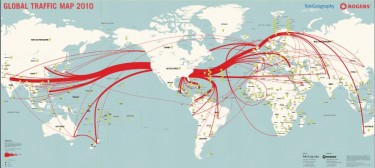This December in Dubai, the International Telecommunication Union—a UN agency—will decide whether it should have regulatory authority over the Internet. This move could pose grave risks to the exercise of human rights online.
Until now, the ITU has been dedicated to setting technical standards for interoperability of international telecommunications, radio, and satellite systems, in addition to promoting access to ICT. But some member states have proposed extending the ITU’s mandate to cover Internet-related technical and policy matters that could place limitations on online privacy, free expression, access to information and ICT use around the world.
The Internet and the ITU / video by ISOC
Advocates around the world are organizing to work against potential threats that such a change could bring to Internet openness. Advocates and experts believe that citizens can have an impact by urging their national governments to support proposals that will protect the open Internet. Given that many of the issues at stake are technically complex, and the ITU process itself is non-transparent and difficult for individuals to follow, civil society groups are working to collect and disseminate resources to help citizens better understand the issue at stake, and to make it easier for citizens to get involved.

Global Internet traffic map. Labeled for reuse. Posted by Martin Irvine.
Here are a few examples of ongoing efforts:
Internet Society: Many international chapters of the Internet Society, a global organization that promotes Internet access for all, are taking action on the issue—a complete directory of chapters can be found here. The main site of the Internet Society also offers useful background information on the ITU process and an informative video on the ITU.
The Center for Democracy & Technology has developed an ITU Resource Center where users will find a letter open for sign-on by civil society groups, and a set of key resources for civil society advocates, including analyses of treaty proposals and the ITU process and an advocacy toolkit with key messages. These materials are under a Creative Commons license—advocates are encouraged to reuse, remix, and distribute these materials in their work on the issue.
WCITLeaks, a website established to allow individuals to anonymously leak ITU process documents for public view, is now doing more than just housing leaked documents—the site’s new resource pages offer links to recent analyses, op-eds, and activism efforts by various NGOs.
Access Now has created a petition urging governments to vote against proposals that would expand the ITU’s mandate to the Internet.
Readers are encouraged to explore these pages and learn more about this important issue. Global Voices Advocacy will continue to post updates on ITU proceedings and civil society efforts leading up to and throughout the time of the December conference
.




9 comments